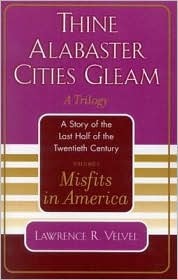

 |

|

The average rating for Thine alabaster cities gleam based on 2 reviews is 5 stars.
Review # 1 was written on 2008-07-24 00:00:00 Luigi Carchia Luigi CarchiaI picked up this book because Tim Keller referenced it in Counterfeit Gods. I was curious what this scholarly book (taken from DelBanco's three speeches at Harvard in 1999) would say for our current world/culture and for my outlook on life. Turns out that even though these speeches were delivered 17 years ago, DelBanco continues to have insight on our culture's self-worship and lack of direction. DelBanco traces our nation's focus and purpose since the Puritans. First, we were directed by God and our faith in Him, then to nation worship and patriotism and now to a directionless focus on self. His insight helped me understand that we are all designed to worship something, and our country as progressed (or regressed) in that worship. While DelBanco does not expressly offer Christian views, he certainly points to how our current path of self-worship is so destructive. He quotes Tocqueville and Emerson extensively, and I was amazed at how those old voices continue to speak truth about our culture today. Here is one insightful quote. Keep in mind that this was written in 1999, but yet remains so insightful for our current state of social media and self-absorption: "...the modern self tries to compensate with posturing and competitive self-display as it feels itself more and more cut off from anything substantial or enduring. It breaks down under bombardment by images that merge fantasy with reality, or by advertising that becomes news. In such a world it is impossible to distinguish foreground from background or the spurious from the authentic." (p. 104). |
Review # 2 was written on 2012-05-15 00:00:00 Rachael Carr Rachael CarrI really enjoyed this book. I thought his analysis of American history was compelling. Here are a few of my favorite quotes: Tocqueville thought that envy and longing were built into American life: that Americans suffered from the illusion that equality could eradicate their envy and prosperity could quench their yearning for happiness. These were illusory hopes, he believed, because "the incomplete joys of this world will never satisfy [the human] heart. "4 THE HISTORY of hope I have tried to sketch in this book is one of diminution. At first, the self expanded toward (and was sometimes overwhelmed by) the vastness of God. From the early republic to the Great Society, it remained implicated in a national ideal lesser than God but larger and more enduring than any individual citizen. Today, hope has narrowed to the vanishing point of the self alone. But, in a paradox that Tocqueville grasped long ago, the cost of possessive individualism can be the loss of the nation itself- I seek to trace the novel features under which despotism may appear in the world. The first thing that strikes the observation is an innumerable multitude of men, all equal and alike, incessantly endeavoring to procure the petty and paltry pleasures with which they glut their lives. Each of them, living apart, is as a stranger to the fate of all the rest; his children and his private friends constitute to him the whole of mankind. As for the rest of his fellow citizens, he is close to them, but does not see them; he touches them, but he does not feel them; he exists only in himself and for himself alone; and if his kindred still remain to him, he may be said at any rate to have lost his country.37 Lincoln never disconnected his ideal of competitive individualism under protection of the Union from the demand that each citizen bear some measure of responsibility for his fellows. Everything he wrote about the rights of the self (culminating in the Second Inaugural Address) was inflected by a sense of public responsibility; and, of everything he believed, his deepest belief was that to save the Union meant to enlarge the circle of hope. There is a phrase in Antonio Gramsci's Prison Notebooks that strikes me in this connection as a useful way of thinking about the life cycle of ideas-a geological metaphor by which Gramsci represents the time-lag between the appearance of new ideas and the disappearance of old ones. "All previous philosophy," he says, leaves "stratified deposits in popular philoso- phy."41 The deposited ideas of Christianity and civil religion are still the bedrock of our culture, whatever intellectuals may think of them. And the history of ideas is usually better understood as a process of incorporation and transformation than as a series of successive movements discrete and distinct from one another. This sapping of symbolic power from transcendent ideas such as God and nation cannot, in the end, be replenished by intensified local commitments-because the most urgent problems of our time are not local problems. We have a global marketplace, but the meager regulatory institutions we have developed (United Nations, World Bank, World Court, International Monetary Fund) have nothing like the power they need to moderate the turbulence of the market or to check the cruelties of local political regimes. From time to time we are embarrassed to be reminded that our gym shoes are made in sweatshops by Asian children, or that our tobacco companies, a bit more hampered than they used to be at home, are free, and zealous, to export cancer abroad. But embarrassment, alas, has no efficacy. |
CAN'T FIND WHAT YOU'RE LOOKING FOR? CLICK HERE!!!